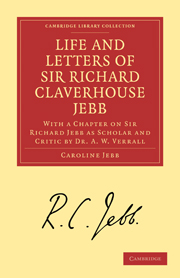 Life and Letters of Sir Richard Claverhouse Jebb, O. M., Litt. D.
Life and Letters of Sir Richard Claverhouse Jebb, O. M., Litt. D. Book contents
- Frontmatter
- PREFACE
- Contents
- CHAPTER I Family History
- CHAPTER II 1841—1858: Childhood and School Days
- CHAPTER III 1858—1862: Undergraduate Years
- CHAPTER IV 1862—1864: Fellowship and College Work.—Tour in Egypt
- CHAPTER V 1865—1870: Diary and Letters.—Public Oratorship
- CHAPTER VI 1871—1872: Letters to C. L. S.
- CHAPTER VII 1872—1874: Cambridge Life and Work
- CHAPTER VIII 1874—1878: Marriage.—Election to Glasgow Chair. Inaugural Address. Letters by Rev. Dr Denney, and Mr R. P. G. Williamson, M.A.—Visit to Italy and Greece.—Illness
- CHAPTER IX 1878—1880: British School at Athens. Hellenic Society.—Visit to Paris.—Challenge by Dr Blackie.—Visit to Venice
- CHAPTER X 1881—1883: Springfield.—Bentley.—Attack on Glasgow University.—The Troad.—School at Athens
- CHAPTER XI 1883—1889: Visit to America.—Professor Fawcett.—Death of Mr Robert Jebb.—Royal Academy.—Ode to Bologna.—Resignation of Greek Chair in Glasgow
- CHAPTER XII 1889—1894: Regius Professor of Greek at Cambridge.—Rede Lecture.—Election to Parliament. First Speech
- CHAPTER XIII 1894—1896: The Welsh Church Disestablishment Bill. Speech.—Illness
- CHAPTER XIV 1896—1898: Conference on Secondary Education.—Visit to the Riviera.—Voluntary Schools' Grant Bill. Sir John Gorst's Education Bill. Burial Grounds Committee
- CHAPTER XV 1898—1900: Death of Mr Gladstone.—Speech on the Rating of Clergymen.—Letters.—Romanes Lecture.—War. Consultation's Committee.—Knighthood
- CHAPTER XVI 1900—1901: Re-election.—Death of the Queen.—Deputation to Mr Balfour.—Irish University Commission
- CHAPTER XVII 1902—1903: British Academy.—Education Bill.—Tercentenary of Bodleian Library.—Trustee of British Museum.—Memorial Cloister at Charterhouse
- CHAPTER XVIII 1904—1905: Letters.—Order of Merit.—Defeat of Government
- CHAPTER XIX 1905: Visit to South Africa.—Last Illness
- The Scholar and Critic
- Index
CHAPTER XIII - 1894—1896: The Welsh Church Disestablishment Bill. Speech.—Illness
Published online by Cambridge University Press: 07 September 2010
- Frontmatter
- PREFACE
- Contents
- CHAPTER I Family History
- CHAPTER II 1841—1858: Childhood and School Days
- CHAPTER III 1858—1862: Undergraduate Years
- CHAPTER IV 1862—1864: Fellowship and College Work.—Tour in Egypt
- CHAPTER V 1865—1870: Diary and Letters.—Public Oratorship
- CHAPTER VI 1871—1872: Letters to C. L. S.
- CHAPTER VII 1872—1874: Cambridge Life and Work
- CHAPTER VIII 1874—1878: Marriage.—Election to Glasgow Chair. Inaugural Address. Letters by Rev. Dr Denney, and Mr R. P. G. Williamson, M.A.—Visit to Italy and Greece.—Illness
- CHAPTER IX 1878—1880: British School at Athens. Hellenic Society.—Visit to Paris.—Challenge by Dr Blackie.—Visit to Venice
- CHAPTER X 1881—1883: Springfield.—Bentley.—Attack on Glasgow University.—The Troad.—School at Athens
- CHAPTER XI 1883—1889: Visit to America.—Professor Fawcett.—Death of Mr Robert Jebb.—Royal Academy.—Ode to Bologna.—Resignation of Greek Chair in Glasgow
- CHAPTER XII 1889—1894: Regius Professor of Greek at Cambridge.—Rede Lecture.—Election to Parliament. First Speech
- CHAPTER XIII 1894—1896: The Welsh Church Disestablishment Bill. Speech.—Illness
- CHAPTER XIV 1896—1898: Conference on Secondary Education.—Visit to the Riviera.—Voluntary Schools' Grant Bill. Sir John Gorst's Education Bill. Burial Grounds Committee
- CHAPTER XV 1898—1900: Death of Mr Gladstone.—Speech on the Rating of Clergymen.—Letters.—Romanes Lecture.—War. Consultation's Committee.—Knighthood
- CHAPTER XVI 1900—1901: Re-election.—Death of the Queen.—Deputation to Mr Balfour.—Irish University Commission
- CHAPTER XVII 1902—1903: British Academy.—Education Bill.—Tercentenary of Bodleian Library.—Trustee of British Museum.—Memorial Cloister at Charterhouse
- CHAPTER XVIII 1904—1905: Letters.—Order of Merit.—Defeat of Government
- CHAPTER XIX 1905: Visit to South Africa.—Last Illness
- The Scholar and Critic
- Index
Summary
In April, 1894, Mr Asquith introduced a Bill “to terminate the establishment of the Church of England in Wales and Monmouthshire, and to make provision in respect of the temporalities thereof.” The debate in the House upon this Bill was long and earnest. The speech Jebb made in defence of the establishment is so characteristic of his style of speaking;—it also explains the situation so clearly, that perhaps my readers will forgive me if I include it here.
“In asking the indulgence of the House for a few minutes only, my aim is less to criticise details than to consider certain large aspects of the question which this Bill brings before us. Vital as the measure is to the highest interests of Wales,—far-reaching as must be its ulterior consequences, should it pass into law, for the Principality,—it is not of less import, and its consequences will not be less extensive or less serious, for England as a whole. It is not merely the first step towards the disestablishment and disendowment of the Church of England, but actually the first instalment of such a measure. Every member of the Church of England is therefore entitled to participate in this discussion, even although (as is my own case) he is ignorant of the Welsh language, and has no such knowledge of Wales as may be acquired by residence. The principle affirmed as justifying the introduction of the Bill has been stated with the utmost frankness and clearness by the Home Secretary. It is simply that at the last general election Wales sent to this House a large majority of members in favour of such a Bill. […]
- Type
- Chapter
- Information
- Life and Letters of Sir Richard Claverhouse Jebb, O. M., Litt. D.With a Chapter on Sir Richard Jebb as Scholar and Critic by Dr. A. W. Verrall, pp. 290 - 312Publisher: Cambridge University PressPrint publication year: 2010First published in: 1907
